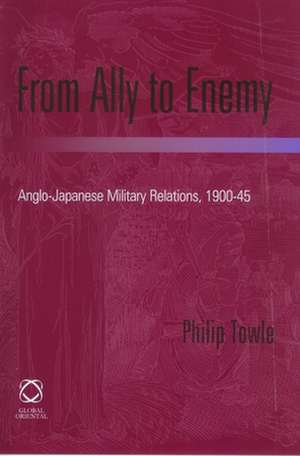From Ally to Enemy: Anglo-Japanese Military Relations, 1900-45
Autor Philip Towleen Limba Engleză Hardback – 7 iun 2006
Preț: 405.52 lei
Nou
Puncte Express: 608
Preț estimativ în valută:
77.60€ • 81.22$ • 64.58£
77.60€ • 81.22$ • 64.58£
Carte indisponibilă temporar
Doresc să fiu notificat când acest titlu va fi disponibil:
Se trimite...
Preluare comenzi: 021 569.72.76
Specificații
ISBN-13: 9781901903683
ISBN-10: 1901903680
Pagini: 195
Dimensiuni: 155 x 235 x 18 mm
Greutate: 0.39 kg
Editura: Brill
Colecția Brill
Locul publicării:United Kingdom
ISBN-10: 1901903680
Pagini: 195
Dimensiuni: 155 x 235 x 18 mm
Greutate: 0.39 kg
Editura: Brill
Colecția Brill
Locul publicării:United Kingdom
Cuprins
Introduction; Acknowledgements; 1 Alliance and War; 2 Helping the Japanese; 3 Reporting on the War; 4 Observing the War; 5 The War and the British Army; 6 The War and the Royal Navy; 7 Ending the War; 8 The Impact on India; 9 The 1920s and 1930s; 10 Strategy and Economics; 11 Prisoners of War; 12 The Literature of Slaves; 13 Korea, Japan and Britain; 14 Afterword; Notes; Bibliography; Index
Notă biografică
Philip Towle has taught at the Centre of International Studies, University of Cambridge, for the last twenty-five years and served previously as its Director. He has worked for the Foreign and Commonwealth Office and for the Australian National University. Amongst his numerous other books are Enforced Disarmament from the Napoleonic Campaigns to the Gulf War (1997) and Democracy and Peacemaking (2000). He is the co-editor of Japanese Prisoners of War (2000). He is married with two children and lives outside Cambridge.
Descriere
This study, closely researched by Philip Towle over the past thirty years, is principally concerned with the military relations between Britain and Japan during the first half of the twentieth century and the ambivalence, misunderstandings and misconceptions that informed their relationship, described by the author as ‘an epic tragedy’. Following the signing of the Anglo-Japanese Alliance in 1902, Japan was held up as a model in Britain and Britain in Japan. But within a generation, the British came to see Japan as the first country to challenge the League of Nations and to begin a new age of imperialism. Conversely, the Japanese armed forces saw Britain as the greatest obstacle to Japanese ambitions in China and elsewhere. In 1936, Lieutenant Commander Tota Ishimaru’s book Japan Must Fight Britain was printed in Britain, its significance ignored at many levels, and five years later the two countries were at war. ‘The feelings stirred up by that conflict,’ notes Towle, ‘still have resonance today.’ From Ally to Enemy brings together a most important body of research that is long overdue in book form and will be widely welcomed by historians and researchers of the period, as well as those seeking more detailed analysis of specific aspects of the pre-war Anglo-Japanese military relationship.
